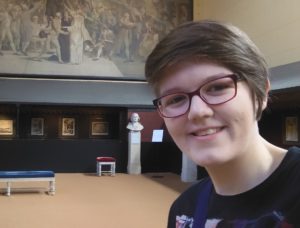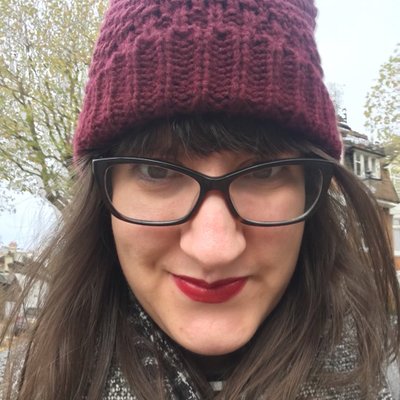Welcome to ‘under the spotlight’, a monthly interview series which offers a snapshot from academics’ lives: their passions, interests and reading suggestions – all summarised in less than ten minutes. You can catch up with previous posts here.
To tie in with the Annual Postgraduate Study Day, this month’s interview is a Postgraduate takeover! We hear from some of the reps to the two societies who organised the event:
Emily Hooke (SSFH)
Susannah Owen (SSFH)


In the length of a tweet what is your research about?
Emily: French Resistance narratives (1940-1958) and how the ways of telling —and changing social and political contexts— influence the stories told.
Susannah: I research the Jacobin club of Paris – a political society which was central to the French Revolution – using a variety of digital humanities methodologies.
What was your motivation for researching French history?
Emily: I chose to do an independent project on the French Revolution in college, which I loved. I did a module on it in first year, then I chose to do a module on the Occupation of France in Third year, in part because of the lecturer, but mainly because I love Casablanca and Humphrey Bogart… and because it gave me an excuse to spend time in Paris.
Susannah: As well as being a fan of French culture, I have always found the French Revolution such an intriguing event! It took place over so few years, and yet there were so many dramatic and surprising twists and turns, from Louis XVI’s attempt to escape the country (the Flight to Varennes), to the fall of the Indulgents. I am interested in how people living through such turbulent years dealt with, and indeed drove, this incredibly rapid pace of political change.
You’re given a time machine for one day. Where would you go? What would you do?
Emily: I’d probably go to witness the Liberation of Paris. Maybe get my photo taken standing proudly atop a barricade I’ve helped construct and use that as the front cover of my thesis/book/time-travel novel-memoir.
Susannah: Without a doubt, I would go back in time to the Revolution. I would go to the Jacobin Club, watch a debate from the public galleries, and explore their now-demolished building. I would also try to meet some of the famous faces of Revolutionary Paris – Marat, Robespierre, Desmoulins, Danton and others.
Who would you invite to your French History fantasy dinner party?
Emily: Definitely Henri Michel and Lucie Aubrac because they fit into a really interesting category of historian-resisters who wrote extensively about their wartime experiences afterwards. They wrote the first histories of the Resistance, and Michel and Marie Granet (also invited) helped collate many of the testimonies I’m using in my thesis. Charles Tillon and Marie-Claude Vaillant-Couturier would be invited because they’d be really interesting, give the Communist angle and maybe challenge Michel a bit, too. Simone de Beauvoir and Martha Gellhorn (an American journalist in the midst of the Liberation while her husband, Ernest Hemingway, was drunkenly ‘liberating’ the Ritz bar — she dumped him soon after), would be there to join me in a feminist rant.
Susannah: I would definitely invite a lot of architects and urban planners of the interwar period, which my masters research focused on. The planner and social reformer Henri Sellier is a particularly fascinating figure, and Eugène Beaudouin and Marcel Lods were so ahead of their time in terms of their architectural visions; it would be so interesting to get to talk to Sellier, Beaudouin and Lods about their ideas. I would also invite Alexandre Maistrasse, Julien Quoniam and Félix Dumail – little-known but important architects working around Paris in the early-twentieth century. After all of those invitees, there would be no room for Revolutionaries, unfortunately – I’d have to have a second dinner party for them!
What have you found most rewarding and most frustrating about your PhD research?
Emily: I find writing and archiving rewarding and frustrating in equal measure. Writing’s a really long, difficult process, but at the end of it you have something tangible to show for it. Whereas archiving can be great fun when you’re looking at all of these old documents and following what you’re interested in, but then you don’t always get what you want or feel you have something solid. I really love getting the chance to chat about research, so going to conferences and seminars to hear what other people are working on and to share my work is probably my favourite bit.
Susannah: The most rewarding thing is being able to read and write about a subject that I am passionate about every day. I feel very fortunate and grateful for the opportunity to do something that I enjoy, effectively as a job. Sometimes the many hours spent working alone can get frustrating, but in London there is a big postgraduate network, and there are always plenty of research seminars and workshops to go to.
What one change would you like to see in Academia during the next 5 years?
Emily: I’d really like to see an end to precarious contracts and an increase in permanent roles available, as well as the pensions issue being resolved!
Susannah: It would be great for academic books and articles to become more affordable, closing the gap that exists at the moment between ‘popular history’ books or magazines on the one hand, and academic monographs or journals – which can be difficult for those without institutional affiliations to access – on the other.
If you weren’t doing a PhD, what would you be doing?
Emily: I love novels and read pretty much constantly, so something to do with books — I’d have probably tried to get into some kind of publishing.
Susannah: I’ve always been a keen guitarist, so I would probably be to trying to make a living from my guitar-playing!
What key piece of advice would you offer anyone considering doing a PhD?
Emily: Make sure you pick a topic that you’re passionate about that’ll keep you going back even when you want to give up… And make sure you find a supervisor who’s supportive and you can work well with, because they’re so important — make sure you meet them before you apply!
Susannah: Make sure the subject that you’re going to be working on is something that you’re totally passionate about. Three to four years (or double that if you’re part-time) is a long time to be working on the same research topic, and you will possibly continue to work with the same research for a long time after the PhD is over, in your future publications.
A few quick-fire questions…
Archives Nationales or Archives Départementales?
Emily: BnF – especially Gallica, which has been an absolute lifesaver!
Susannah: Gallica!
Writing in silence or to music?
Emily: Depends on the day! I usually find a bit of background noise soothing, but sometimes I need silence, or forget to put on more if I’ve finished an album.
Susannah: I always write to music! I listen to almost any genre – video game soundtracks; Daft Punk and other electronic music; or metal bands like August Burns Red and Iron Maiden.
Best conference you’ve ever been to?
Emily: I think probably the ‘Writing the History of Youth in the Modern World’ conference at Sheffield… even though it was a largely anglo-centric conference and so only two people came to my paper! It was a lesson in realising that one really interested audience member can make all the difference, and all the papers I went to — especially the first panel — were excellent.
Susannah: SSFH 2015 at St Andrews. This was the first big academic conference that I went to, where I met some historians whose work I’d been reading for years, as well as postgraduates working on some really exciting topics. It was great fun!
REF or TEF?
Emily: Errrm — pass!
Susannah: EFEF – The Excellence Framework Excellence Framework, which ranks the excellence frameworks.
Typed or handwritten?
Emily: Typed! Then I can search through my notes when I need to
Susannah: Typed.
Éclair or saucisson?
Emily: Éclair forever
Susannah: Éclair.
***
If you’d like to suggest someone to feature on the blog, then let us know via @FrHistNwk.


